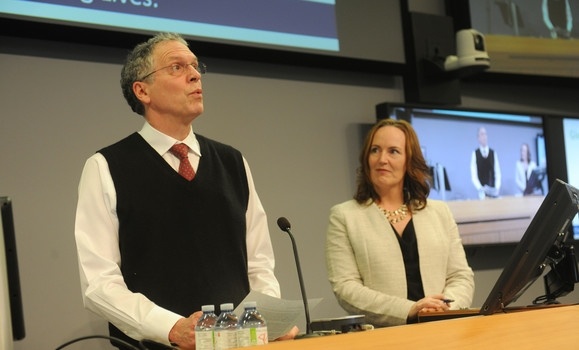Researchers at Dalhousie University have analyzed the effectiveness of bullying prevention programs with the aim of improving lives for Nova Scotia children and saving money for the province’s school boards.
“We’re hoping to better inform educational institutions about effective bullying prevention initiatives so that adolescents are better equipped to deal with bullying and peer victimization,” says Dr. John LeBlanc, associate professor of pediatrics at Dalhousie Medical School and staff pediatrician at the IWK Health Centre.
The analysis, which has been delivered to school boards across the province and Canada in the form of a toolkit, can also be used to better streamline resources dedicated to school-based bullying prevention programs.
“Currently, schools implement bullying prevention strategies without clearly knowing whether or not they’ll provide good value for the precious human and financial resources devoted to them,” says Dr. LeBlanc. “Our analysis was done to help schools — and other organizations working with youth — evaluate these programs with respect to effectiveness, cost and overall fit.”
Promoting healthy, respectful relationships is key
The team reviewed seven popular bullying prevention programs. Some are used in Nova Scotia schools, and others were identified through a search of scientific literature. Of the seven, only one – WITS – could be recommended.
“WITS stands for 'walk away, ignore, talk it out and seek help,'” explains Ashley Chisholm, master’s candidate in the Department of Community Health & Epidemiology. “We found that WITS delivers stronger effects than other programs at a lower cost, and shows long‐term benefits. The program also has components that promote healthy relationships.”
The other six programs were resource‐intensive, yet delivered little or no reduction in bullying perpetration or victimization.
“These programs require hundreds or thousands of dollars in up-front costs for materials and trainers, in addition to the time put in by teachers and students that could be spent on the curriculum,” says Tanya Bilsbury, master’s candidate in the School of Public Administration. “Yet, we found that the actual effects of evidence-based programs were often very small or even absent.”
“Of course, there will always be a place for individual and group strategies for those who bully or who are bullied,” says Dr. LeBlanc. “These targeted strategies can build upon school-wide programs that focus on creating safe and respectful climates, and programs that help youth develop their social and emotional skills.”
“This toolkit is a very useful aid to schools and others seeking to prevent bullying and cyberbullying, and the many negative consequences of this bullying,” says Wayne MacKay, Dal law professor and former chair of the Nova Scotia Task Force on Bullying and Cyberbullying. “It’s clearly based on a thorough analysis of the evidence.”
The project was funded by the Social Sciences and Humanities Research Council.

